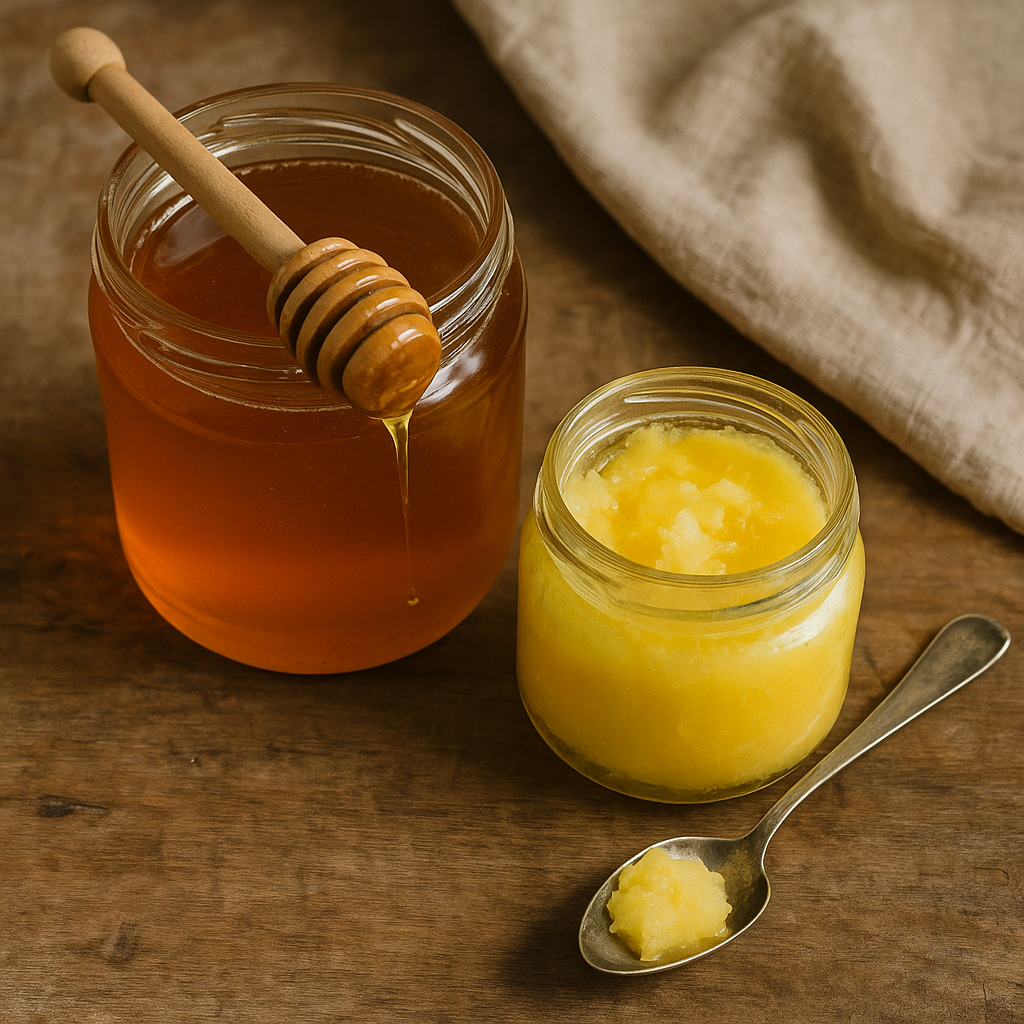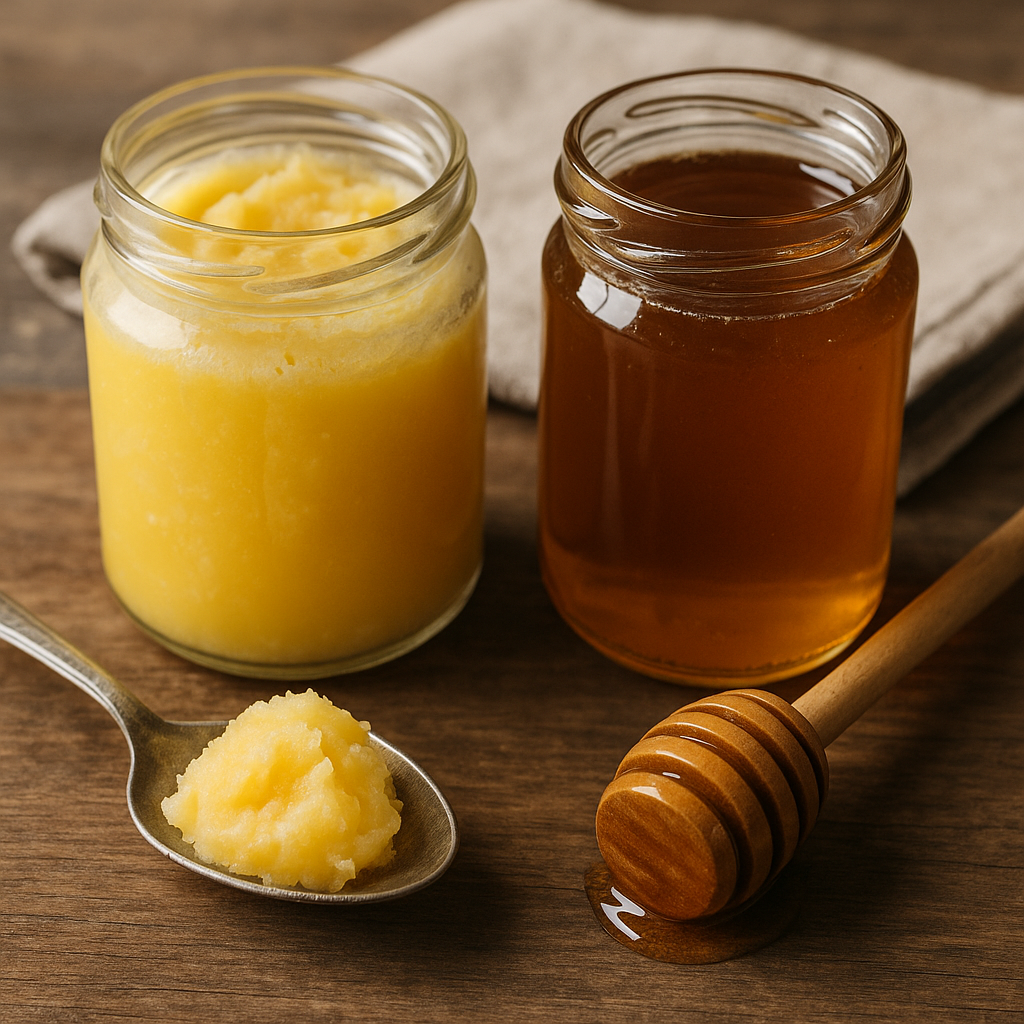Ask Ayurvedic doctor a question and get a consultation online on the problem of your concern in a free or paid mode. More than 2,000 experienced doctors work and wait for your questions on our site and help users to solve their health problems every day.
Is Ghee and Honey Combination Poisonous?

Ghee and honey — two of the most treasured ingredients in Ayurvedic traditions and modern kitchens alike. But somewhere along the way, a warning started circling the internet: Is ghee and honey combination poison? People are now left confused, wondering if their grandmother’s age-old remedy is actually harmful. You might've heard phrases like “ghee and honey mix is poison” or “don’t eat honey and ghee together,” but is there real science or ancient wisdom behind these claims?
Before you toss out your morning spoonful of golden ghee blended with raw honey, let’s take a deeper look. In this article, we’ll unpack the origins of this belief, what Ayurveda actually says, the science (and myth) behind it, the potential side effects of honey with ghee when misused, and how to safely enjoy the powerful benefits of this combo. Because yes — when used right — honey and ghee together can be more helpful than harmful. Let’s get into it.

Ghee and Honey in Ayurveda: A Classic Duo
In Ayurveda, food isn’t just sustenance — it’s medicine. And ghee and honey are two of its most celebrated healers. Ghee, a form of clarified butter, is praised for its ability to nourish the brain, lubricate joints, and support digestion. Honey, on the other hand, is seen as a natural energizer, immune booster, and wound healer.
The idea of combining honey and ghee together actually comes from ancient practices that valued balance — especially when using natural substances. These two ingredients are often paired in wellness recipes like herbal pastes (churnas) or detox drinks. But here’s the twist: the way you mix them matters.

Is the Combination of Ghee and Honey Poisonous?
This is the million-dollar question. And it’s not as black-and-white as the internet makes it sound.
What Ancient Texts Actually Say
The concept that “ghee and honey mix is poison” when taken in equal proportions comes from classical Ayurvedic texts — specifically from Charaka Samhita. According to these ancient scripts, consuming equal parts of ghee and honey by volume (not weight!) may lead to the formation of “ama” — or toxins — in the body.
But it’s not a death sentence or literal poison. In Ayurveda, “visha” (poison) is often a metaphor for imbalance. What it’s really warning us about is poor digestion, metabolic burden, and long-term discomforts, like sluggishness, skin issues, or even joint pain.
So when people ask, is ghee and honey combination poison, the answer is: Not if you use them correctly.
Role of Proportion and Preparation
The key lies in the proportions and temperature. Equal parts by volume is what’s discouraged. Mixing one teaspoon of ghee with two teaspoons of honey? That’s generally considered safe. But heating honey — especially above 104°F (40°C) — is a big no-no in Ayurveda. Warmed or cooked honey becomes hard to digest and may produce toxins in the body.
Sadly, many modern recipes ignore this. People add honey and ghee together in hot tea or spread it on hot toast. And that’s where trouble starts.
Conclusion
So, is ghee and honey combination poison?
Well, yes... and no. Like many things in life (and Ayurveda), the answer isn’t black and white. The claim that the ghee and honey mix is poison stems from ancient Ayurvedic guidance about proportions, temperature, and preparation. If you mix equal amounts of honey and ghee by volume and especially if you heat the honey — that’s when problems might arise. Side effects like poor digestion, toxin buildup, and subtle health imbalances can follow.
But if used mindfully — in the right ratio, at the right temperature — this combo can be a nourishing, energizing addition to your daily routine. The benefits of honey and ghee together range from better digestion and skin health to improved focus and vitality. The trick? Don't overthink it, but also don’t be careless with it.
Ultimately, it’s about balance. Ayurveda isn’t trying to scare us — it’s trying to teach us how to align with nature’s rhythms. So no, your grandmother’s recipe wasn’t deadly. She just knew not to mess up the ratio ;)
So go ahead, enjoy your honey ghee — just don’t dump it into boiling porridge or measure it out 1:1 with your eyes closed.
And if you’ve read this far? Share this post. Seriously. People need to stop panicking and start understanding.
FAQs
Can I mix honey and ghee in warm water or food?
Yes, but here’s the key: warm, not hot. You can stir ghee and honey into lukewarm water or food, as long as it's below 104°F (40°C). Ayurveda warns against heating honey, because it changes its chemical structure and may become hard to digest (or even mildly toxic over time). So, let your tea or oatmeal cool a bit before adding honey with ghee.
Also, make sure you're not mixing equal volumes — use a ratio like 2:1 or 1:2 instead.
What happens if ghee and honey are taken in equal amounts?
This is the big one, right?
Taking ghee and honey in equal amounts by volume is what’s discouraged in classical Ayurvedic texts. It’s said to create ama, or metabolic waste, which can lead to indigestion, sluggishness, and imbalance in the long term. You probably won’t drop dead after one equal spoonful (don't panic), but regularly consuming them this way could be harmful.
Always vary the ratio and keep your portions small — a little goes a long way. It’s not a poison in the modern sense, but it can be a digestive irritant if misused.
Final Word
Look, health myths spread fast — especially ones that sound scary. The phrase “is ghee and honey combination poison” caught fire online because it's dramatic. But most folks never read the original Ayurvedic context or even understood the nuance.
This article aimed to clear up the confusion, deliver real value, and help you make better decisions about something that's actually quite healing when used right. Hopefully, it also gave you something to share at dinner tonight when someone brings it up again 😉

